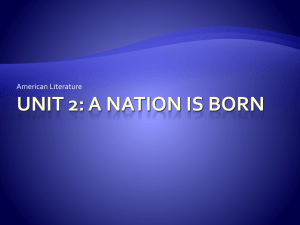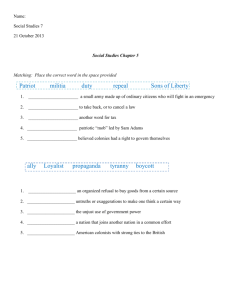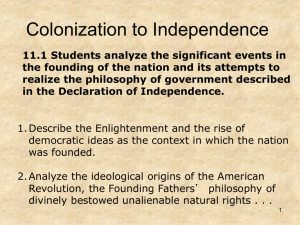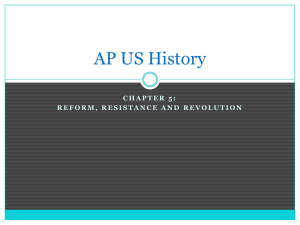The Revolutionary Period 1750-1800
advertisement
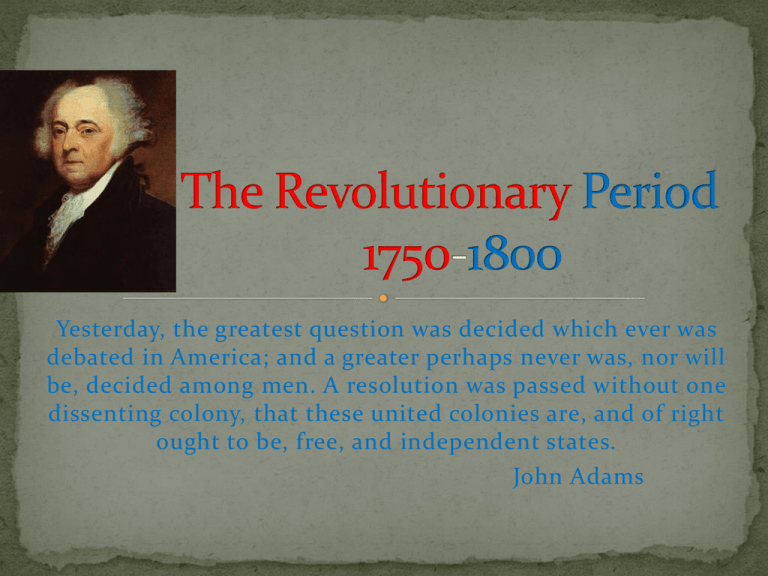
Yesterday, the greatest question was decided which ever was debated in America; and a greater perhaps never was, nor will be, decided among men. A resolution was passed without one dissenting colony, that these united colonies are, and of right ought to be, free, and independent states. John Adams John Adams became the second President of the United States. The previous quote was written by him in a letter to his wife on the eve of the signing of the Declaration of Independence. The signing of the Declaration on July 4, 1776, capped more than a decade of controversy between England and the American colonies. More than a decade of struggle to establish the new nation followed. During those years – indeed, during the entire second half of the eighteenth century - American literature was largely political. So dominant was the question of our relationship to England, and so talented and literate were the statesmen of the emerging nation, that some of the most notable writers of the period were the founders of the republic. It is easy to forget how long the 13 original states had been colonies. By 1750 there were fourth and fifth generation Americans of European descent living in Virginia and New England. Year by year, decade by decade, Americans acquired experience in the art of selfgovernment. As late as the early 1760’s, however, few Americans had given much thought to the prospect of independence Between 1765 and 1775, the attitudes of the colonists changed dramatically… King George III and parliament imposed a number of unwise regulations the threatened the liberties of the colonists. With each succeeding measure, the outrage in America grew, finally erupting in war. The 18th century is often characterized as the Age of Reason, or the Enlightenment. This movement was spurred on by the work of 17th century scientists such as Galileo and Sir Isaac Newton These writers and thinkers of the Enlightenment valued reason over faith Unlike the Puritans, they had little interest in the hereafter, believing instead in the power of reason and science to further human progress. They spoke of a social contract that forms the basis of democratic government… Above all, they believed that people are by nature good, not evil. Among the most influential figures of the Enlightenment were the French writer, Voltaire; the French philosopher Jean Jacques Rousseau; the English political historian John Locke, and the Scottish historian David Hume Educated readers in the American colonies were familiar with the writings of these men…. The American Revolution was preceded by the French and Indian War (a struggle between England and France over control of North America When the French and Indian War officially ended in 1763, France gave up its claims to North American territory The British government, wanting to raise revenue in the colonies to pay their war debt, make a series of unfortunate decisions which sets the stage for war…. The Stamp Act of 1765 Required buying and affixing stamps on 54 kinds of items: Newspapers Playing cards Legal documents Almanacs Colonists responded by: Burning stamps Beating stamp distributors Destroying shops No deaths > Act was repealed within 6 months Townshend Acts 1767 Taxed: Paper Paint Glass Lead Tea Colonists boycotted British sent troops to Boston “Boston Massacre” “Redcoats” fired on a taunting mob, killing five people Repealed all Townshend taxes except for tea Tea Act (1773) Gave a monopoly of the American tea trade to an English company Bostonians (dressed as Mohawks) dumped a tea shipment into the Boston harbor – “The Boston Tea Party” As punishment the Coercive Acts were imposed Coercive Acts (1773-74) AKA: Intolerable Acts Closed port of Boston until the East India Tea Co. was reimbursed for their shipment “Royal” governor took control of MA Sheriffs and juries became “Royal” employees British imposed the right to quarter (house) soldiers anywhere This united the Colonists against the British Colonial leaders met in Philadelphia for the first Continental Congress. April 18, 1775 Shots were fired in Lexington, Mass. Eight Americans killed Redcoats continued to Concord, Mass. Two Americans were killed Three Redcoats killed “The Shot Heard ‘Round the World” Key Battles Battle of Bunker Hill – killed or wounded 1,000+ British soldiers; the Second Continental Congress meets in Philadelphia and appoints the first official Commander in Chief of the American Army; this, of course, is George Washington Battle of Saratoga – after this victory, France began to commit troops to the aid of the American cause… The war finally comes to an end at Yorktown, Virginia, on October 19, 1781 General Cornwallis surrenders seeing that escape is impossible Unlike the Puritans, writing during the Revolutionary period or “Age of Reason” was not focused on private soulsearching. Rather, it was public writing The mind of the nation was on politics and so was the writing/rhetoric The writing of permanent importance from the Revolutionary era is mostly political writing. Patrick Henry Speech against the Stamp Act Speech at the Virginia Convention Expressed ideas of independence from Britain Thomas Paine Most influential “Common Sense” pamphlet Jan. 1776 Sold 100,000 copies in three months Thomas Jefferson Declaration of Independence The Constitution Alexander Hamilton, James Madison, John Jay The Federalist Letters to NY newspapers Later published as a collection of essays America was beginning to separate itself culturally from England; however, there were still no notable American novels or plays The modern short story still had not been invented Sound, clear arguments in support of causes were considered the great literary works of the day Most writing written work was in the form of: Pamphlets Political documents Speeches During this period, America began to establish a cultural identity of its own… Theaters were built from New York to Charleston… A number of new colleges were established after the war… By the early 1800s… America could boast a small body of national literature Native Americans had contributed haunting poetry and legends through their oral traditions The Puritans had written a number of powerful, inward-looking works… The statesmen of the Revolutionary period produced political documents for the ages The raw materials for a great national literature were at hand, waiting to be used. The nation stood on the threshold of a territorial and population explosion unique in the history of the world.

